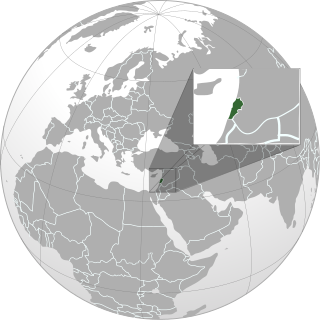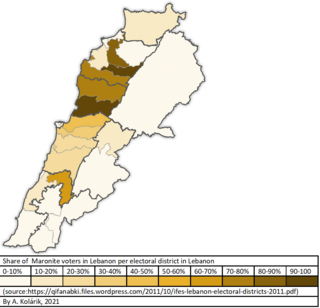Related Research Articles

Nasrallah Boutros Sfeir was the patriarch of Lebanon's largest Christian body, the Maronite Church, an Eastern Catholic Church in communion with the Holy See. He was also given the honorific title of cardinal. He was elected Patriarch of Antioch for the Maronites on 27 April 1986, and his resignation was accepted on 26 February 2011. He was the 76th patriarch of the Maronite Church, with the official title of "His Beatitude the 76th Patriarch of Antioch and the Whole Levant".
Bassel Fleihan was a Lebanese legislator and minister of economy and trade. He died from injuries sustained when a massive bomb exploded on the Beirut seafront as he passed by in former Lebanese prime minister Rafik Hariri's motorcade on 14 February 2005.

Peter Hans Kolvenbach was a Dutch Jesuit priest and professor who was the 29th superior general of the Society of Jesus, the largest male Catholic religious order.

The Union of the Armenian Evangelical Churches in the Near East, abbreviated as UAECNE, is an autonomous body of Armenian Evangelical churches comprising 25 congregations throughout Lebanon, Syria, Turkey, Greece, Egypt, Iran, Iraq and Australia.

The Catholic Church in Lebanon is part of the worldwide Catholic Church under the spiritual leadership of the Pope in Rome.

Christianity in Lebanon has a long and continuous history. Biblical Scriptures purport that Peter and Paul evangelized the Phoenicians, whom they affiliated to the ancient patriarchate of Antioch. Christianity spread slowly in Lebanon due to pagans who resisted conversion, but it ultimately spread throughout the country. Even after centuries of Muslim rule, it remains the dominant faith of the Mount Lebanon region and has substantial communities elsewhere.


The history of the Jews in Lebanon encompasses the presence of Jews in present-day Lebanon stretching back to biblical times. Following large-scale emigration following the 1948 Arab–Israeli War, and much more importantly the Lebanese Civil War, the vast majority of Lebanese Jews now live in Western countries and many live in Israel. As the latest census in Lebanon was conducted in 1932, there are virtually no statistics available. In 2006, there were about 40 Jews in Lebanon, whereas in 2020 there were only about 29 Jews in Lebanon. Reports indicate that in 2022 the number of Jews in Lebanon was 27 to 20.

The National Evangelical Church of Beirut (NEC) is a reformed church in Beirut, member of the National Evangelical Church Union of Lebanon.
The Beirut Stock Exchange is the principal and only stock exchange of Lebanon. Located in Beirut, it is a public institution run by a committee including a Chairman, a Vice-Chairman and eight members appointed via a decree issued by the Council of Ministers, in accordance with a proposal by the Minister of Finance. All BSE members are Lebanese Joint stock companies (SAL) with a capital above £L500,000 and registered at the secretariat of the Commercial Register in. Members include holding companies and offshore companies. The BSE authorizes Brokerage firms the operation and trade in securities listed on the BSE according to the Bourse trading system and also lists the issuing companies that have any of their stocks or other financial instruments listed.

Lebanon is an eastern Mediterranean country that has the most religiously diverse society within the Middle East, comprising 18 recognized religious sects. The religions are Islam and Christianity. The Druze concern around an estimate of 5% of the citizens in Lebanon. Furthermore, outside of Lebanon, Lebanese people are mostly Christians. It is also estimated that a large proportion of its population are refugees, which affects statistics. The refugees, who mostly are of Syrian or Palestinian origin, are predominantly Sunni Muslim, but also include Christians and Shia Muslims.

The Armenian Revolutionary Federation, also known simply as Tashnag, is an Armenian political party active in Lebanon since the 1920s as an official political party in the country after having started with small student cells in the late 1890s and early 20th century.

The Evangelical Church of the River Plate is a United, Protestant denomination with congregations in Argentina, Paraguay, and Uruguay. It is named after the Río de la Plata Basin, where the majority of its congregations are located. The IERP was affiliated with the Evangelical Church in Germany from 1934–1965, when it became independent. The church ordains women as ministers and supported civil unions and same-sex marriage. It has approximately 27,500 members.

The Lebanese Republic and the Republic of India established diplomatic relations in 1954. Lebanon maintains an embassy in New Delhi, while India maintains one in Beirut.

Lebanese Maronite Christians are adherents of the Maronite Church in Lebanon, which is the largest Christian denomination in the country. The Maronite Church is an Eastern Catholic Church in full communion with the worldwide Catholic Church.
The National Evangelical Synod of Syria and Lebanon (NESSL), also known as Synod SL, is a Reformed denomination in the Middle East. It is a federation of Arabic-speaking congregations, that trace back their origin to the evangelical revival in the 19th century. These churches adopted Reformed theology and Presbyterian church government. This Reformed revival was supported by many Reformed churches in the United States. The Ottoman authorities recognised the Protestant faith in 1848, the first congregations were founded in Beirut, Hasbaya. Later congregations were established in the major cities. The Synod was organised in 1920 with several Presbyteries. There has been a steady growth in new members in recent years.
The Apostolic Vicariate of Beirut is a Latin Church ecclesiastical jurisdiction or apostolic vicariate of the Catholic Church in Lebanon, where Eastern Catholics are far more numerous. In 2010, there were 15,000 baptized. Its current bishop is Cesar Essayan.
Lamia Moubayed Bissat is a Lebanese public servant.

The 17 October Protests, commonly referred to as the 17 October Revolution were a series of civil protests in Lebanon that began after the Lebanese cabinet announced financial measures on 17 October 2019. These national protests were triggered by planned taxes on gasoline, tobacco, and VoIP calls on applications such as WhatsApp, but quickly expanding into a country-wide condemnation of sectarian rule, the stagnation of the economy, unemployment, endemic corruption in the public sector, legislation that was perceived to shield the ruling class from accountability and failures of the government to provide basic services such as electricity, water, and sanitation.
Mainly between March 16, 1977 and March 30, 1977 a series of massacres on Christian civilians took place in the Chouf region during the Lebanese Civil War. The massacres were mostly committed by Druze gunmen of the People's Liberation Army after the assassination of Druze leader Kamal Jumblatt. Many victims were mutilated and women were reportedly sexually abused.
References
- ↑ "Member churches | Bringing together 80 million Reformed Christians worldwide". Wcrc.ch. 2013-02-14. Archived from the original on 2012-08-08. Retrieved 2013-09-23.
- ↑ "Address data base of Reformed churches and institutions". Reformiert-online.net. Retrieved 2013-09-22.